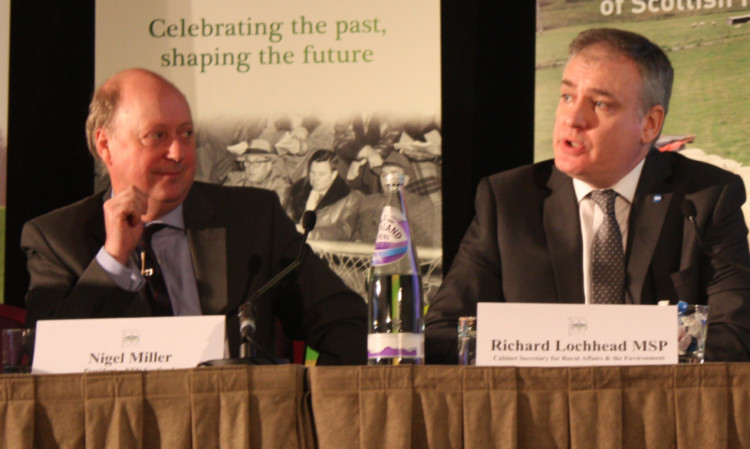It was hardly a surprise that Richard Lochhead’s speech to the NFU Scotland annual meeting in St Andrews was a highly political one with much of the emphasis on the independence referendum.
No one would expect anything less, with the vote only seven months away.
But, as Cabinet Secretary for Rural Affairs, he first he had to tackle the pressing issues of CAP reform.
“I am launching a full-frontal assault on inactivity. We need a CAP that supports dirty wellies and not comfy slippers,” he said.
A meeting with EU Farm Commissioner Dacian Ciolos had been requested so that Mr Lochhead and his officials could put forward new plans to exclude inactive farmers, especially on the vast unproductive areas of the north and west, from claiming payments under the new CAP.
The Cabinet Secretary repeated his view that he has proposals to hand which would make the so-called Scottish clause a workable proposition.
He did, however, seem genuinely puzzled by suggestions made on Monday in St Andrews by Defra Minister George Eustice regarding a higher level of coupled payments for the livestock sector.
Mr Eustice had said Defra would look favourably on Scotland using up to 13% of its total budget on these payments, but that the Scottish Government had to make its own case in Brussels.
“Of course, if it is simply a matter of asking the European Commission then we will do that. But I am perplexed because, when the original negotiations were under way, Defra ministers insisted on taking the lead and did not push for Scotland to have access to the maximum level of coupled payments,” said Mr Lochhead.
On the issue of Scotland’s very low overall CAP funding allocation, he added: “Not one ministerial finger in Whitehall, including the Scotland Office, was lifted to secure a fairer budget for Scotland. UK ministers negotiated Scotland to rock bottom of the league table for both pillars of the CAP.”
Mr Lochhead had already wished Defra Secretary Owen Paterson, a speedy recovery following eye surgery, but there is clearly little love lost between the two.
“I will never forget Owen Paterson describing our priorities as, and I quote, ‘itty bitty issues that can be sorted out in the margins’. Scotland’s key priorities described as itty bitty issues!” he said later.
There was much more of this pre-referendum political point-scoring in Mr Lochhead’s speech, but he still had to answer questions from the delegates on EU membership in the case of a Yes vote.
Scottish Secretary Alistair Carmichael had on Monday told the NFUS meeting that there was no chance of Scotland gaining fast-track approval for EU membership.
Mr Lochhead argued the opposite, saying: “Scotland has been a member of the EU for 40 years and it is in no one’s interest for Scotland to be out of the EU for one second. Apart from anything else, the Common Fisheries Policy would collapse without Scotland.”
He added: “The terms of membership will be negotiated between September 18 and the date of independence in 2016. We will be part of the UK and the EU for the duration of these talks.”
Pushed on what would happen if Scotland failed in its EU membership bid, Mr Lochhead insisted that payments equivalent to those under CAP would be made by the Scottish Government. Scotland would be one of the wealthiest countries in the developed world and could afford to make these payments. If the country was admitted to the EU it would be a net contributor.
Mr Lochhead was also questioned hard on the possible introduction of absolute right to buy (ARTB) for tenant farmers.
Borders farmer Stephen Withers told of a young farming couple who had lost their farm after 10 years of back-to-back 364-day grazing leases.
“The only reason they are having to leave is because their landlord is terrified of ARTB being introduced and doesn’t want to lease the farm in any way. Why have you left ARTB on the agenda for so long and not abandoned it?” Mr Withers asked.
ARTB would only be applied to secure 1991 Act tenancies, and the landlord in this case should not have been concerned, replied Mr Lochhead. The Agricultural Holdings Review Group is currently looking at ARTB, among a number of other issues, and until it had reported later in the year it would be wrong to speculate on whether ARTB would be introduced.
In all, Mr Lochhead’s speech was a politically charged one aimed at an audience that he knows well after seven years in post.
For those looking for a hint of how farmers might vote in the referendum there were few clues.
A clap-o-meter or some such device might have been able to measure the difference between the applause granted to Mr Lochhead to that given to Mr Carmichael a day earlier, but to this writer’s ear they sounded identical polite but slightly restrained. Many minds clearly still have to be made up.
